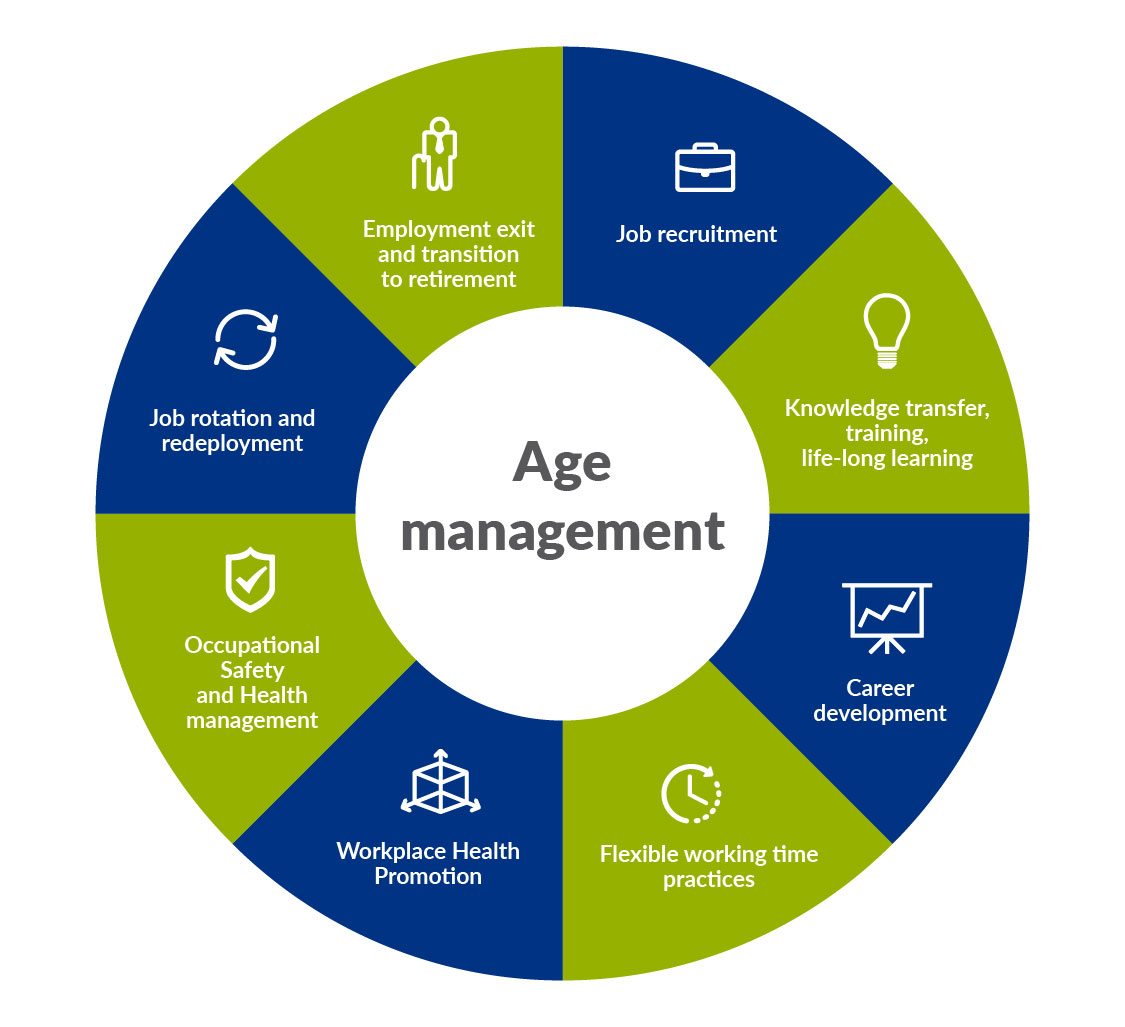What is age management?
Age management refers to the various dimensions by which human resources are managed within organisations with an explicit focus on ageing and, also, more generally, to the overall management of the workforce ageing via public policy or collective bargaining. (Source)
Essential principles of age management include:
- An emphasis on prevention rather than reactive problem solving;
- A focus on the whole working life and all age groups, not just older workers; and
- A holistic approach encompassing all dimensions that contributes to effective age management.
Age management refers to the various dimensions by which human resources are managed within organisations with an explicit focus on ageing and, also, more generally, to the overall management of the workforce ageing via public policy or collective bargaining. (Source)
Essential principles of age management include:
- An emphasis on prevention rather than reactive problem solving;
- A focus on the whole working life and all age groups, not just older workers; and
- A holistic approach encompassing all dimensions that contributes to effective age management.
Elements of
Age management refers to the various dimensions by which human resources are managed within organisations with an explicit focus on ageing and, also, more generally, to the overall management of the workforce ageing via public policy or collective bargaining. (Source)
Essential principles of age management include:
- An emphasis on prevention rather than reactive problem solving;
- A focus on the whole working life and all age groups, not just older workers; and
- A holistic approach encompassing all dimensions that contributes to effective age management.
The following figure presents the different elements of
Age management refers to the various dimensions by which human resources are managed within organisations with an explicit focus on ageing and, also, more generally, to the overall management of the workforce ageing via public policy or collective bargaining. (Source)
Essential principles of age management include:
- An emphasis on prevention rather than reactive problem solving;
- A focus on the whole working life and all age groups, not just older workers; and
- A holistic approach encompassing all dimensions that contributes to effective age management.

- Recruitment: Recruitment processes that focus on skills and experience, avoid age discrimination, and promote age diversity, bring many benefits to organisations. Read more (HR module).
- Knowledge transfer, training and life-long learning: Workers of all ages should have access to training and should be able to update their knowledge and skills. This is particularly relevant in the context of changing work practices and the introduction of new technologies. Read more (HR module).
- Career development: Career development should be seen in the context of the whole working life, ensuring a match between the job and the competences and capacities of the worker. Read more (HR module).
- Flexible working time practices: Flexible working time arrangements take into account the different needs of different age groups and help improve work-life balance. Read more (HR module).
-
Workplace health promotion is the combined efforts of employers, employees and society to improve the health and well-being of people at work. This can be achieved through a combination of (1) improving the work organisation and the working environment; (2) promoting active participation; and (3) encouraging personal development. (Source)
: Improving the work organisation and working environment, increasing workers' participation, and encouraging personal skills and professional development. Read more (next theme). - Occupational safety and health management: Ensuring safety and health at work for workers of all ages through the implementation of age-sensitive risk assessments and adaptation of the workplace. Read more (next section).
- Job rotation and redeployment: Job design techniques in which workers are moved between two or more jobs in a planned manner at regular intervals. Read more (HR module).
- Employment exit and the transition to retirement: Supporting older workers in the planning of retirement. Read more (HR module).
In the UK, the National Institute for Health and Care Excellence (NICE) have updated their guidance on management practices for workplace health to include guidance on managing older employees. The guidance is aimed at employers, managers and line managers with a view to improving workplace health.
The next section focuses on occupational safety and health management as part of
Age management refers to the various dimensions by which human resources are managed within organisations with an explicit focus on ageing and, also, more generally, to the overall management of the workforce ageing via public policy or collective bargaining. (Source)
Essential principles of age management include:
- An emphasis on prevention rather than reactive problem solving;
- A focus on the whole working life and all age groups, not just older workers; and
- A holistic approach encompassing all dimensions that contributes to effective age management.
Risk assessment is a step in the OSH risk management process that allows identifying potential risks and hazards that workers may be exposed to and deciding on protective and preventive measures that are necessary to be implemented. It is a dynamic process that allows organisations to put in place a proactive policy for managing occupational risks. (Source)
and workplace adaptations.